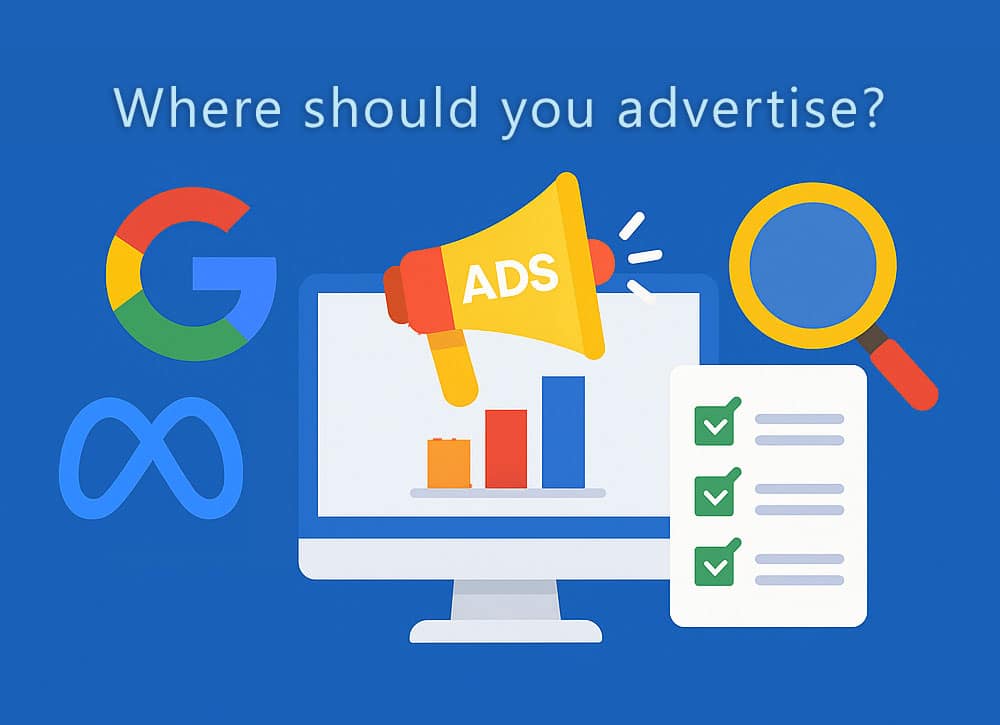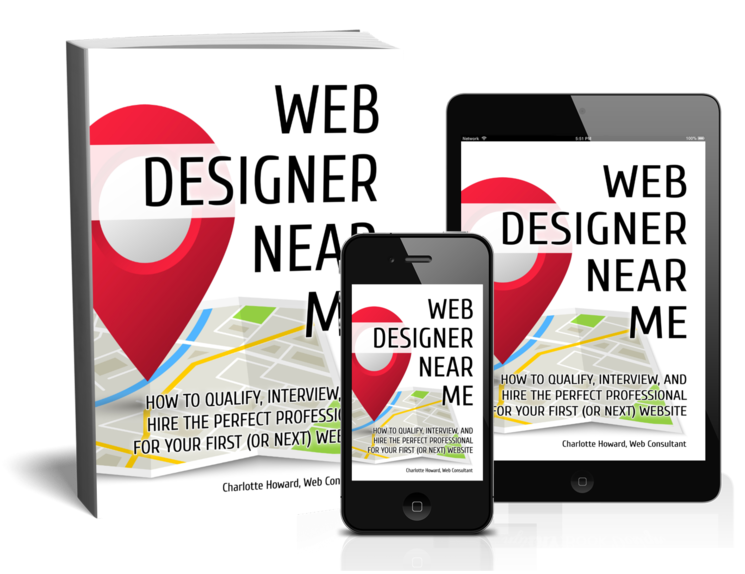Not all ad platforms are created equal, and not all buyers behave the same across them.
Choosing the right platform for your paid ads isn’t about following the latest trend or copying your competitors. It’s about understanding where your ideal customer hangs out, how they make decisions, and what kind of interaction they’re likely to have with your brand.
Let’s break it down so you can make smarter decisions with your advertising dollars.
Google Ads vs. Meta Ads
Active Search vs. Passive Awareness
Google Ads (Search, Display, YouTube) reach people who are actively searching for a solution.
Meta Ads (Facebook & Instagram) reach people who are scrolling, relaxing, or casually browsing.
This is the biggest difference between the two:
- Google Ads = Intent-based marketing
Someone types in “emergency plumber near me” or “best hiking tours in Arizona.” They’re ready to take action. - Meta Ads = Interest-based marketing
You’re interrupting them with something relevant, fun, or emotionally engaging. You’re planting a seed.
Pro Tip: Use Google Ads when your offer solves a time-sensitive problem. Use Meta when your offer needs visual storytelling, trust-building, or has a longer buying cycle.
Business Type Matters
Some platforms work better depending on your industry:
| Industry Type | Best Ad Platforms |
|---|---|
| Emergency Services | Google Search |
| Restaurants & Retail | Meta, Google Maps, Instagram |
| Wellness & Lifestyle Brands | Instagram, TikTok, YouTube |
| E-commerce | Facebook, Instagram, Google Shopping |
| B2B or High-Ticket Services | Google Search, LinkedIn, YouTube |
| Local Service-Based Businesses | Google Search, GBP, Facebook |
Know Your Comfort Zone (and Your Content Library)
Are you comfortable being on video? Do you have brand photos? Can you write a great caption or tell a story?
Your own content style (and bandwidth) matters:
- If you have professional photos and are comfortable with lifestyle content → try Instagram or Pinterest.
- If you’re camera-shy but great at writing or answering FAQs → try Google Search Ads with strong landing pages.
- If you’re willing to do quick demo videos or product walk-throughs → YouTube Shorts, Reels, or TikTok Ads could be your sweet spot.
One Channel at a Time vs. Multichannel Ads
Many small businesses try to “be everywhere” too soon. That leads to watered-down results, wasted ad spend, and confusing messaging.
Start with one platform. Master it. Then expand.
✅ Learn what works
✅ Split-test one thing at a time (headline, image, call-to-action)
✅ Dial in your cost per lead or sale
✅ Build your list, retarget your audience
Only after that should you branch into an omnichannel marketing strategy where your brand shows up everywhere with a unified message.
Creative Formats: What Works Where?
| Platform | Best Performing Creatives |
|---|---|
| Google Search | Text ads + landing pages |
| Google Display | Static images + retargeting |
| Facebook/Instagram | Lifestyle photos, testimonials, short videos |
| YouTube | Short educational or behind-the-scenes videos |
| TikTok | Fast-paced, relatable content with UGC style |
| Thought leadership posts, B2B lead magnets |
Pro Tip: No matter where you advertise, storytelling still wins. People remember emotions, not just features.
Intent, Timing & Buyer Psychology
Paid ads should match the mindset of the buyer at that moment.
- Cold Traffic? Use video, curiosity hooks, storytelling, emotional pain points.
- Warm Traffic? Use offers, urgency, retargeting, testimonials, trust-builders.
- Hot Traffic? Use direct CTAs like “Book Now,” “Schedule Your Free Call,” or “Buy Today.”
Different platforms = different levels of readiness. Choose wisely.
Tracking ROI: Numbers Don’t Lie
Paid ads without tracking is like sailing with no compass.
At a minimum, you should track:
- Cost per click (CPC)
- Cost per conversion
- Conversion rate (ad → lead → sale)
- Return on ad spend (ROAS)
- Lifetime value (LTV) of a customer
Use tools like:
- UTM parameters for Google Analytics
- Meta Pixel or Google Ads Conversion Tracking
- Call tracking for local businesses
- CRM integration for lead attribution
Final Thoughts
Choosing the right platform for paid advertising is part science, part strategy, and part self-awareness.
It’s not just about where the clicks come from. It’s about who clicks, why they click, and what happens next.
Start simple. Measure everything. Refine continuously.
Need help choosing the right platform or building a campaign that converts?
Let’s chat. At Accelerated Web Systems, we help service-based businesses, tour operators, and high-end home automation providers grow with strategic, ROI-focused digital marketing.


